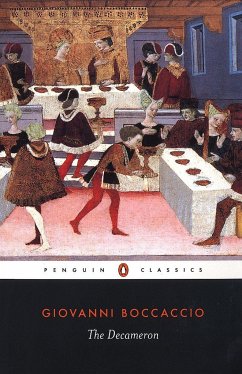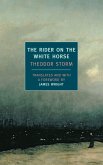The Decameron reads in some ways as a guide to social distancing and self-isolation. The New York Times
The 14th-century Italian book that shows us how to survive coronavirus. New Statesman
A complete edition of the hilarious, bawdy, irreverent masterpiece of medieval Italy and the inspiration for the film The Little Hours in an acclaimed translation
In the summer of 1348, as the Black Death ravages their city, ten young Florentines take refuge in the countryside. They amuse themselves by each telling a story a day for the ten days they are destined to remain there a hundred stories of love, adventure and surprising twists of fate. Less preoccupied with abstract concepts of morality or religion than with earthly values, the tales range from the bawdy Peronella hiding her lover in a tub to Ser Cepperello, who, despite his unholy effrontery, becomes a Saint. The result is a towering monument of European literature and a masterpiece of imaginative narrative.
This is the second edition of G. H. McWilliam s acclaimed translation of The Decameron. His introduction illuminates the worlds of Boccaccio and of his storytellers, showing Boccaccio as a master of vivid and exciting prose fiction.
Hinweis: Dieser Artikel kann nur an eine deutsche Lieferadresse ausgeliefert werden.
The 14th-century Italian book that shows us how to survive coronavirus. New Statesman
A complete edition of the hilarious, bawdy, irreverent masterpiece of medieval Italy and the inspiration for the film The Little Hours in an acclaimed translation
In the summer of 1348, as the Black Death ravages their city, ten young Florentines take refuge in the countryside. They amuse themselves by each telling a story a day for the ten days they are destined to remain there a hundred stories of love, adventure and surprising twists of fate. Less preoccupied with abstract concepts of morality or religion than with earthly values, the tales range from the bawdy Peronella hiding her lover in a tub to Ser Cepperello, who, despite his unholy effrontery, becomes a Saint. The result is a towering monument of European literature and a masterpiece of imaginative narrative.
This is the second edition of G. H. McWilliam s acclaimed translation of The Decameron. His introduction illuminates the worlds of Boccaccio and of his storytellers, showing Boccaccio as a master of vivid and exciting prose fiction.
Hinweis: Dieser Artikel kann nur an eine deutsche Lieferadresse ausgeliefert werden.
McWilliam s finest work, [his] translation of Boccaccio s Decameron remains one of the most successful and lauded books in the series. The Times (London)
The Decameron, by Giovanni Boccaccio (1313 1375), made a great impression on me. . . . Ten youths seven women and three men take turns telling stories for 10 days. At around the age of 16, I found it reassuring that Boccaccio, in conceiving his narrators, had made most of them women. Here was a great writer, the father of the modern story, presenting seven great female narrators. There was something to hope for. . . . The seven female narrators of the Decameron should never again need to rely on the great Giovanni Boccaccio to express themselves. . . . The female story, told with increasing skill, increasingly widespread and unapologetic, is what must now assume power. Elena Ferrante, The New York Times
The Decameron, by Giovanni Boccaccio (1313 1375), made a great impression on me. . . . Ten youths seven women and three men take turns telling stories for 10 days. At around the age of 16, I found it reassuring that Boccaccio, in conceiving his narrators, had made most of them women. Here was a great writer, the father of the modern story, presenting seven great female narrators. There was something to hope for. . . . The seven female narrators of the Decameron should never again need to rely on the great Giovanni Boccaccio to express themselves. . . . The female story, told with increasing skill, increasingly widespread and unapologetic, is what must now assume power. Elena Ferrante, The New York Times









